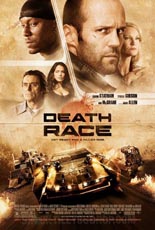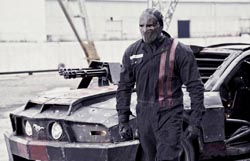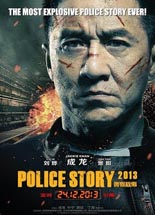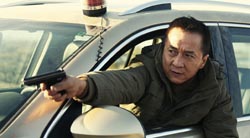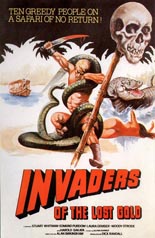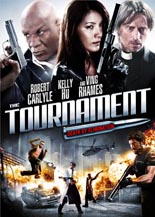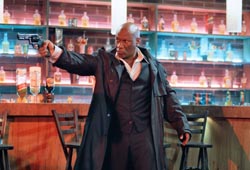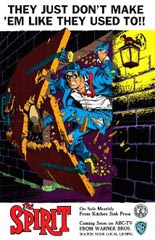
 Seven years after breaking big in/as Flash Gordon, Sam Jones got the chance to play another Sunday-funnies superstar with/as The Spirit. All right, so it was made for TV, but at least this time, Jones didn’t have to suffer the indignity of having his voice dubbed by someone else. An added bonus (although we wouldn’t know it for another two decades and some change) is that the ensuing telepic is a greater, grander entertainment than Frank Miller’s $60 million stink-bomb adaptation for the silver screen.
Seven years after breaking big in/as Flash Gordon, Sam Jones got the chance to play another Sunday-funnies superstar with/as The Spirit. All right, so it was made for TV, but at least this time, Jones didn’t have to suffer the indignity of having his voice dubbed by someone else. An added bonus (although we wouldn’t know it for another two decades and some change) is that the ensuing telepic is a greater, grander entertainment than Frank Miller’s $60 million stink-bomb adaptation for the silver screen.
Being a feature-length pilot for ABC’s intended series, this version scripted by Die Hard scribe Steven E. de Souza depicts the origin story of Will Eisner’s comic-book creation: After presumably being shot dead by a baddie, the square-jawed, straight-and-narrow cop Denny Colt takes advantage of his antagonist’s assumption by donning a sliver of a blue mask to disguise his identity. Reborn as The Spirit, basically a superhero in a GQ-worthy suit, Colt sets about cleaning his beloved Central City of its crime problem, vigilante-style. That no one recognizes him — not even gal pal Ellen Dolan (a miscast Nana Visitor, aka Mama Voorhees of 2009’s Friday the 13th remake) — is ludicrous, but just let it ride; as comics readers know, that’s just the style and, er, spirit of the piece.
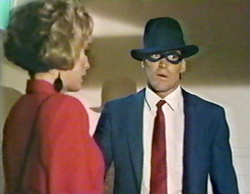 Faithful though it is to Eisner’s source material, this Spirit makes one major change that’s hard to argue against: giving young sidekick Ebony White an upgrade from his 1940s stereotype — a step above Stepin Fetchit — to a modern, palatable role. Now named Eubie, he’s played by Enemy Mine’s pint-sized Bumper Robinson. Hopefully, the shift would have happened regardless, but that it did is not at all surprising, especially considering blaxploitation pioneer Michael Schultz (Cooley High) was at the helm. That said, Schultz’s Spirit is left with a few unfortunate hallmarks of its own era: namely, big hair on the ladies, a synth-sax score and multiple Rick James references.
Faithful though it is to Eisner’s source material, this Spirit makes one major change that’s hard to argue against: giving young sidekick Ebony White an upgrade from his 1940s stereotype — a step above Stepin Fetchit — to a modern, palatable role. Now named Eubie, he’s played by Enemy Mine’s pint-sized Bumper Robinson. Hopefully, the shift would have happened regardless, but that it did is not at all surprising, especially considering blaxploitation pioneer Michael Schultz (Cooley High) was at the helm. That said, Schultz’s Spirit is left with a few unfortunate hallmarks of its own era: namely, big hair on the ladies, a synth-sax score and multiple Rick James references.
On the plus side, where dozens more tick marks reside, The Spirit boasts a vibrant color palette that predates Warren Beatty’s Dick Tracy, a general pulp vibe as enjoyable as an ice-cold glass of Tropicana, and a permeating sense of humor that’s mostly meant to be, even if our effective detective twice says, “Crime, especially murder, is never a laughing matter.” —Rod Lott

